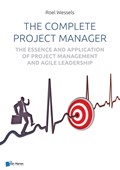This book is about the how of project management and about how you as a project manager can use a proactive attitude to stay in control, even during difficult situations. It shows you how to become an influencer of the path to the end result, of your environment, of your team and of your effectiveness. Today's project managers have to meet high expectations. Challenging goals, a strong focus on cost management and lead times, serving the interests of different stakeholders and many dependencies between subprojects make project management an increasingly complex affair - especially in an environment where change and uncertainty have become the new norm. In addition, the creative abilities of knowledge workers have to be optimally utilised, which requires less hierarchical organisational structures and more multidisciplinary collaboration. Having the right project management skills is therefore essential at virtually every level of an organisation. As a result of these challenges, there is a growing demand for comprehensive methods and the popularity of Agile is on the rise. On the other hand, the increased complexity also results in a need for simplicity. That is what this book is about: going back to the basics, being able to combine useful elements from different methods and focusing on the most important aspect of all: the person behind the project manager! This book contains a wealth of practical descriptions with useful examples and anecdotes. Readers are constantly stimulated to internalise the essence and put it into practice in a manner that suits their own style and personality. That is the only way to keep at it, be successful and make others believe in you! The book consists of three parts. Part 1 (chapters 1 to 4) describes how to set up and manage a project. The focus is on the basic principles, the essence of taking control, creating structure and using Agile behavior. Part 2 (chapters 5 and 6) explains how to draw up a plan and schedule in small steps, which results in improved completeness, coordination and support. Finally, part 3 (chapters 7 to 10) covers how to manage the project execution: how to realize the path to the final goal with a strict PDCA rhythm, how to evaluate the quality of interim results and how to keep your team and environment motivated.

